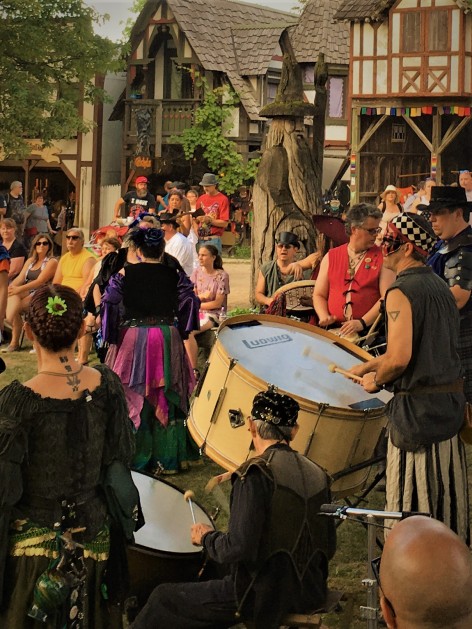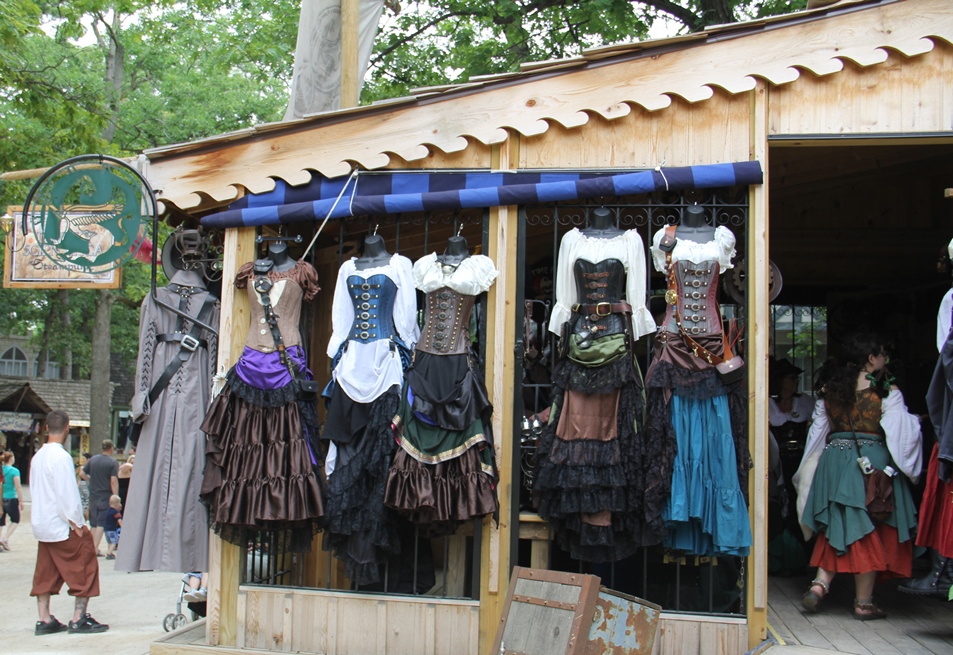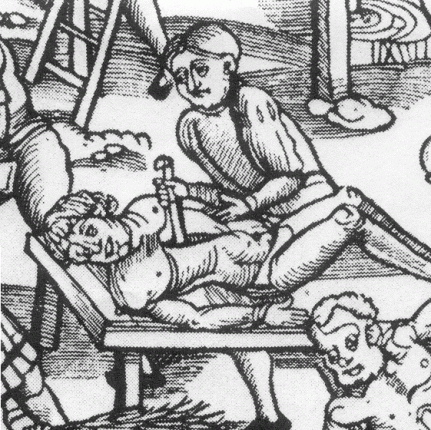
Drowning became a grand, opulent transformation.

Drowning became a grand, opulent transformation.

“Are you going to Scarborough Faire?
Parsley, sage, rosemary and thyme.
Remember me to one who lived there.
She once was a true love of mine.” — Traditional English Ballad
My favorite thing to do in summer is go to the Renaissance Faire! As a matter of fact, the Ren Faire is sort of my idea of heaven on earth. Luckily, we have one every year in Bristol, Wisconsin, which is only about a two hour drive from Chicago, so I get to go quite often.
A lot of people have never had the pleasure of attending one of these galas. If you have never been, I suggest you find one, get your groove on and go! The Ren Faire has something for everyone and is a guaranteed good time for all.
Just ask these guys!

In addition to the normal Renaissance festivities, each week the Bristol Faire features a different theme. These include cool things like pirates & swashbucklers, monsters & magic, heroes & villains, comic-con and steam punk! What’s not to like?
It usually starts out with a parade. These gypsy girls stole the show with their colorful costumes and bodhráns.
“If music be the food of love, play on!” — William Shakespeare

But what exactly is the Renaissance, and why have a faire about it?
The word “renaissance” means “rebirth”. It generally refers to a period in European history spanning from the 14th to 17th centuries — although some folk claim that the 10th and 12th centuries qualify as well. The Renaissance was a part of the Middle Ages that bridged culture into the Age of Enlightenment. Most historians consider it the beginning of the Early Modern Era. It was a great time of innovation, open-mindedness and scientific discoveries. The invention of the printing press led to a flourishing of literature and the arts. This was Shakespeare’s time, and although the theater was still considered bawdy, it gained wide acceptance and was favored by Queen Elizabeth.
The Renaissance era is closely associated with the Elizabethan era. As a matter of fact, Queen Bess herself is often seen riding though the streets of Bristol!

With a few courtiers on hand.

Of course, a Ren Faire is nothing without a bit of dancing and music. One of their catch phrases is “Party like it’s 1599!” 🙂

Drums are especially popular!

And flutes!

And my personal favorite, the harp.

The Ren Faire is a shopaholic’s dream, with all kinds of merchants eager to sell their wares. You can purchase jewelry, clothing, nick-nacks, books, and all the necessities like drinking horns, blown glass, tarot cards and tapestries.
It is a great time to explore your inner Elizabethan persona, or add a wench outfit to the wardrobe.

Gandalf the Wizard takes time away from ring quests and journeys into Mordor to preside over festivities.

And then there is the joust!

Jousting was a martial game that originated in the Middle Ages. It was played between two horsemen wielding lances. The two opponents rode towards each other at high speed, with the goal of breaking each others shields and in some cases, de-horsing each other. Medieval jousting was a fierce and bloody sport. It was banned in France in 1559 after King Henry II died of wounds inflicted in a tournament. Nonetheless, jousting remained popular in many countries.
In England King Henry VIII was a big fan. Unfortunately, he had a huge jousting accident which nearly killed him. The accident occurred at a tournament at Greenwich Palace on January 24, 1536 when Henry was 44 years old. Henry, in full armor, was thrown from his horse. The horse, also in full armor, then fell on top of Henry! The King was unconscious for two hours and it was probably a miracle that he survived. The accident left him with a terrible ulcer in his leg that distressed him for the rest of his life. Some historians think it was this incident that contributed to Henry’s tyrannical ways and all the beheadings he ordered in his later life. Needless to say, the King’s jousting days were over after that, but the sport remained popular throughout the Renaissance period.
The modern day Ren Faire has a much tamer version of the joust. However, they still use real horses and real shields, and it is very exciting! Here, the Order of the Sun vs. the Order of the Moon. The tournament is presided over by Lady Cordelia.

The Ren Faire is something of a freak show, full of jesters, jugglers, stilt walkers, sword swallowers and mud eaters. You never know who you’ll meet. This guy was eager to shake hands 🙂

What would a country faire be without livestock? If you are thinking of bringing your children, please do! Bristol has a petting zoo, complete with sheep, goats, llamas and Shetland ponies.

They even have rides! However, you won’t find any roller coasters or Ferris wheels. All Ren Faire rides are powered by wind alone, along with some human elbow grease. My nephew decided to give the bungee challenge a try, with the help of a friendly pirate. AARRGGHH!

“My soul is in the sky.” — William Shakespeare

Falling backwards over the trees!

Upside-down 🙂

Several more flips are involved.

Descending…

And back on land with our friendly pirate.

Speaking of pirates, seafaring women are greatly underestimated! This gal was modeled after Grace O’Malley, a real-life female swashbuckler who led many raids along the coast of Ireland.

Grace O’Malley was captured by British forces and ended up in prison for eighteen months. However, after appealing directly to Queen Elizabeth, she garnered some sympathy. The Queen allowed that Grace be given back her fleet and continue on to sail the high seas! Maybe Queen Bess took pity on Grace, another woman who sought to rule in a male dominated profession 🙂
Before closing time at the Faire, all gather for the big dance. Marauders, invaders, Vikings, Saxons, Goths and pillagers of all stripes are welcome!

Finally, our revels are ended and the ladies of the court bid us good-bye.

An excellent time was had by all. I highly recommend the Renaissance Faire for historical fun. It is a blast from the fabulous past that somehow seems not so distant, but oddly reminiscent of our current time…
“Come now, what masques, what dances shall we have, to wear away this long age of hours?” — William Shakespeare


Shakespeare was a believer. Are you?
June brings a long line of holidays. Not only do we have the Solstice, but also Saint John’s Eve (June 23), International Pink Day (June 23) and finally, the grand slam, June 24, International Fairy Day!
It’s a heady time of year. Everything is in bloom, the seasons are changing, the air is full of lush, hypnotic smells and the veils are lifted. Everyone gets a little crazy. Poets dream and lovers love. June is still the most popular month for weddings.
Ever wonder where we get the name ‘honeymoon’? Honey that is gathered under the full moon in June is said to be the most potent. In Medieval times it was used to make a magical mead served at weddings, specifically designed to bless the newlyweds. Hence the name ‘honeymoon’.

The magic of the month did not escape Shakespeare. In A Midsummer Night’s Dream, he created three weddings and a reunion between Oberon and Titania, the Fairy king and queen.
Shakespeare had a lot of inspiration.
In the sleepy, backwoods town of Stratford, fairies were never far away. Folks believed in all kinds of superstitions, including changelings. Fairies were said to kidnap healthy human children and in place of them leave a sickly ‘changeling’. Boys were particularly in demand, and families took precautionary measures to guard them.
Terrified that the fair folk would come and kidnap their male children, mothers in Stratford kept their sons dressed in gowns and did not cut their hair till the child’s seventh birthday! (Seven being the age of reason.) The boy was then finally put in pants. This was called ‘breeching’. They even had a little ceremony for it. (Apparently, they thought the fairies would somehow miss this…)
Have you ever wondered about those weird, overlapping, thatched Tudor roofs? Well, there’s a fairy superstition behind them!

Some historians say that overlapping roofs were designed to block the moonlight. This was because people believed the fairies could manipulate moon’s energy to cause insanity — or at least pixie-lead them for the night. The fairies could cause illusion, make you mad, turn you into an animal or bring you into the Other-world.
And then you never know what might happen! Titania has been known to trap a man or two in her bower…

But it wasn’t all bad. Shakespeare’s fairies may have gotten a bit mischievous, yet they always gave a blessing in the end. Indeed, some of the fairies were more humane than humans! (At least they did not stab Caesar in the back…)
TITANIA: “First, rehearse your song by rote
To each word a warbling note:
Hand in hand, with fairy grace,
Will we sing, and bless this place.”
OBERON: “Now until the break of day,
Through this house each fairy stray.
To the best bride-bed will we,
Which by us shall blessed be.” — A Midsummer Night’s Dream, V.I
For more about fairies, witches, aliens, and their symbiotic relationships, click here.
Have a fantastic fairy day, and count your blessings!


Shakespeare knew betrayal. He wrote about many. Perhaps one of the most chilling was the death of Julius Caesar, who apparently believed himself to be invincible.
On March 15, 44 BC Roman emperor Julius Caesar was stabbed to death near the Theater of Pompey, where his senate held a meeting. His enemies, who had been conspiring for months, were unbeknownst to him. Total backstabbers! Caesar was loved by many and had apparently done little to provoke the attack.
The assassination, however, did not come without its warning. One month previous, Caesar had been approached by a soothsayer who told him: “Beware the Ides of March”. In ancient Rome, the “Ides” would have been understood to be the middle of the month, or March 15th.
Have a happy March 15th and watch your back!
Here is a re enactment from the 1970 film, Julius Caesar. Hope you like it!

If you were living in a Shakespearean play who would be your true love? Are you hot for Hamlet, mad for Macbeth, pining for Prospero or crazy for Caesar?
Take this fun quiz and find out!

I am apparently enamored with Puck. No big surprise! Everyone knows I live in A Midsummer Night’s Dream and am no stranger to fairies.
Puck is one mischievous creature and is bound to take you to new heights during your sexy time with him. He’s definitely capable of making you extra thirsty just by whispering in your ear. He’s the only one who will make you laugh all the way to the bedroom.


Juliet Capulet, from Shakespeare’s famous tragedy ‘Romeo and Juliet’, is one of the few (or perhaps the only?) characters in the Shakespeare canon whose exact age and birthday we know without a doubt.
How do we know? Shakespeare tells us!
In Act I of the play – before all the romance, sword fights and slayings occur – Juliet’s mother (Lady Capulet) and her Nurse discuss plans for Juliet’s marriage.
Lady Capulet seems a bit clueless about her daughter’s age. She asks the Nurse:
“Thou knowest my daughter is of a pretty age… She’s not fourteen?”
The Nurse replies:
“I can tell her age unto an hour. I’ll lay fourteen of my teeth she’s not fourteen! How long till Lammas tide?”
Juliet’s mom replies: “A fortnight and odd days.”
The Nurse then says: “Even or odd, of all the days of the year, come Lammas Eve at night she shall be fourteen.”

It is around two weeks until Lammas, and the Nurse remembers, to the exact hour, Juliet’s birth the night before.
(We will, for the moment, abandon our horror at the substandard parenting. Juliet and her mom do NOT have a close relationship. The Nurse has been Juliet’s pseudo-parent and confidante. We will also forget our horror at the idea of the adults planning a marriage for a thirteen year old…)
Lammas (also called Lughanasadh) is a traditional Harvest Festival celebrated on August 1st. Because the Nurse says ‘Lammas Eve at night’ we know Juliet was born on the night of July 31st.
This makes Juliet a Leo!

Not surprising. After all, Leo the Lion is ruled by the sun. They are headstrong and passionate, natural born leaders, and by far the most loving and generous sign of the zodiac.
If you have ever known a true Leo, you know they are loyal, big-hearted, and will stop at nothing to pursue Love. Juliet lives up to the Leo characteristics.
First, she falls deeply in love with Romeo. At first sight.
Well, you can’t blame her for that.

Secondly, when Juliet discovers Romeo is from the enemy camp, she comes up with the heartfelt but illogical scheme that they ought to simply change their names — and then (la la la) their love would be acceptable!
“What’s in a name? That which we call a rose
By any other word would smell as sweet…
Romeo, deny thy father and refuse thy name
And I’ll no longer be a Capulet.”
Youth and naivety. But hey, someone had to be optimistic.
Then, even though she has only known him for a few hours, Juliet says she is willing to lay it all on the line for Romeo:
“And all my fortunes at thy foot I’ll lay
And follow thee my lord throughout the world.”

Later, Juliet marries Romeo in secret. Even though she has only known him for one day.
When she learns Romeo has been exiled, Juliet is still determined to lose her virginity and have a night of passion with her husband. She bids the Nurse to arrange it:
“But I a maid, die maiden widowed?
Come, come, come, Nurse, I’ll to my wedding bed
And death if not Romeo take my maidenhead!”

After that she goes against her father’s wishes when she refuses to marry Count Paris. Here, Juliet the Leo proves herself headstrong and innovative. A girl of Juliet’s status going against Dad’s orders was definitely taboo. Of course, Mr. Capulet has no idea what his daughter has actually been up to…

Later, Juliet risks it all for love once again when she agrees to take Friar Laurence’s really bad, but well meaning advice of swallowing a potion to fake her own death. Juliet’s actions are the classic heart-over- head moves of a young and passionate Leo.
Shakespeare knew astrology.

And then of course, the shifty and fateful stars cross again. Romeo, thinking Juliet is ACTUALLY dead, drinks poison at her graveside. Upon awakening to find a dead Romeo, Juliet stabs herself. She knows life without Romeo is simply not worth living.
Ah well.
But you gotta give the girl credit for trying!
Juliet knew love. She knew love of the highest order, and more importantly she knew a universal law: Love, in its infinite supply, is the one thing that never runs out. This was perhaps Shakespeare’s hidden meaning.
Although it is often dismissed as a play about ‘those crazy star-crossed teenagers’ who were ‘dumb enough to commit suicide’ — I believe Shakespeare had a bigger message in mind. The world in which they lived refused to allow their love, and yet after their deaths, the Caps and Montagues resolve all conflicts. Love grows and goes on, even in death. Romeo and Juliet are buried together. Love never dies, love is infinite, and there is enough for everyone.
Consider Juliet’s words to Romeo in the famous Balcony Scene:
“And yet I wish for the thing I have.
My bounty is as boundless as the sea,
My love as deep; the more I give to thee
The more I have, for both are infinite.”
Pretty deep for a thirteen year old, eh? But then again, she was a Leo.


Are you watching TNT’s new series ‘Will’, about the life of young William Shakespeare as a newcomer in the London theater scene, circa 1588?
And if not, WHY NOT???
Okay, okay. I know Shakespearean scholars are rolling their eyes, saying how DARE this series take such liberties? They have changed Elizabethan London into a gritty punk rock world of mohawks and warpaint! They have used historically inaccurate costumes! They have made up a background story of Will as a persecuted Catholic. They have given him a fictional lover named Alice Burbage and set him in a (horror of horrors) rap showdown with fellow playwright Robert Greene! And they expect any educated sincere student of Shakespeare to watch this trash?
The answer is YES!!
For far too long, Shakespeare has been buried in a dusty old cellar of books marked ‘highbrow’, ‘difficult’ and ‘boring’. People do not realize he was once a 24 year old trail blazer, full of talent and ambition, thrown into a vicious, provocative and cosmopolitan city. He had a wife and three children to support and was determined to make his mark.
I am here to defend this series and tell you why — if you are interested in the Bard and his ilk — you must watch at once! Or at leas watch this trailer.
First of all, there is very little we know for sure about young Will Shakespeare. He married Anne Hathaway at age 18, had three children, somehow ended up in London and became the most famous playwright in the world.
Documentation tells us that his twins, Hamnett and Judith, were baptized on Feb. 2, 1585. In 1592 there was a derogatory review written by playwright Robert Greene which referred to Shakespeare as an ‘upstart crow’ and a ‘Shake-scene’.

Other than that, no one really has any idea what young Master Shakespeare was doing between the ‘lost years’ of 1585 to 1592.
Most likely he was in London, perfecting his craft, making contacts and worming his way into the theater. Anyone who has read the plays knows he was a man of passion. He could not possibly have written all he did without some actual life experience.
There are some other things, though, that we DO know about the young Bard — which give clues to possible truths portrayed in the new series
1) Being Catholic?
Shakespeare very well may have been a closet Catholic. His mother’s family, the Ardens, were devout Catholics. Years later, Catholic artifacts such as rosaries and Extreme Unction kits (which had been forbidden) were found in Shakespeare’s childhood home.

Being a closet Catholic was dangerous and life threatening in Protestant England.
When Queen Bess came to the throne in 1558, Catholicism was outlawed, but people still practiced in secret. Bess would probably have been lenient, but eventually, as more Catholic plots threatened the Queen’s life, laws against Catholicism got stricter. Practicing Catholicism could get you drawn and quartered.
This meant basically that they would cut you in quarters and pull out your intestines before hanging you as a traitor.

Yeah. I’d keep it a secret too.
2) Elizabethan Theater = Punk Rock? You bet!
The entertainment scene of the 16th century was not respectable in the least. Theaters were bawdy places full of raucous nut jobs who engaged in drinking, whoring and pick-pocketing. All along the south bank of the Thames River, arm in arm with the theaters were houses of prostitution and dens for bear baiting. Some theaters even doubled as bear pits on their off days!
Bear baiting was like dog fighting — on steroids. A chained bear would be teased and tormented by dogs, then let loose to claw them to pieces. Which shows just how dangerous/ crazy this environment was.
Playwrights were often arrested for writing seditious material. It was a constant envelope-push to see how much politically incorrect and offensive stuff they could get away with.

Plays provided cheap, rowdy entertainment. Any peasant could come in off the street, pay a half-penny entrance fee and stand in front of the stage. These were known as ‘groundlings’ — unwashed, unkempt, swilling ale, and not beyond throwing stuff at the stage if the entertainment was not good enough. Sound familiar?

Besides that, the costumes used in the series are creative, stunning and tailored. Queen Bess meets Vivienne Westwood. It may not be historically accurate but…
Would you really want to watch guys dressed like this?

No, I wouldn’t either.
3) The Many Loves of Will Shakespeare?
Shakespeare’s plays deal with love in all its forms — forbidden, absurd, sublime, fulfilled and unrequited. He arguably knew the minds of women better than any other male writer of his time and beyond. Much like the 90’s movie ‘Shakespeare in Love’, the TNT series attempts to show how young Will may have gotten his inspiration.
Her name is Alice. She is the daughter of theater owner James Burbage and sister to actor Richard. In real life, James Burbage had no known daughters, but Alice’s character is an ambitious, intelligent woman stifled by 16th century rules. She defies her father and often cross-dresses for her own safety — providing the inspiration Will would have needed for his female characters. (Think Portia, Viola, Desdemona and Juliet.)
And what of Christopher Marlowe? The notorious playwright/ spy who dominated the Elizabethan theater scene until his untimely death at age 29 is played by Jamie Campbell Bower. Marlowe, openly gay and staggeringly handsome, may prove an additional temptation for Will.
Who was the ‘Fair Youth’ of Shakespeare’s love sonnets? (Hint: Not a woman!)
‘
4) Eerie Resemblance?
No one really knows what young Will actually looked like. This portrait, dated from the late 16th century, unearthed with other actor’s portraits and coinciding exactly to his age, is often thought to be Shakespeare.

Compare to the actor cast as Will: Laurie Davidson

Weird resemblance, right? Perhaps a ghost is present!
By now I should have convinced you to take a look a this series. You can watch the first episode free here: Will Sneak Peak.
Let me know what you think!

The Bard knew capers. He used a lot of court jesters and clowns in his plays, so capering should naturally be a part of his stories. It is a colorful word, conjuring up images of frolic and flirtation. But capering is not all fun and games!
Take Richard III.

When the War of the Roses ends, Richard should be happy. His house, Team York, has won. Not only is his brother Edward declared the undisputed King, but now the York men have a lot of free time on their hands and they could spend it wooing the ladies.
“Grim-visaged war hath smooth’d his wrinkled front;
And now…
He capers nimbly in a lady’s chamber
To the lascivious pleasing of a lute.”
Yet Richard is apparently still in the winter of his discontent. There will be no capering in the ladies chambers for him, as he feels he is not handsome enough to engage in sex play:
“But I, that am not shaped for sportive tricks,
Nor made to court an amorous looking-glass;
I, that am rudely stamp’d, and want love’s majesty
To strut before a wanton ambling nymph;
I, that am curtail’d of this fair proportion,
Cheated of feature; Deformed…
Why, I, in this weak piping time of peace,
Have no delight to pass away the time,
Unless to spy my shadow in the sun
And descant on mine own deformity:”
Ouch! Poor Richard. He had nothing better to do during peace time than watch his own shadow and lament his deformity. (Later he began to plot against his family and lock his nephews in the Tower…)
But Shakespeare may have been unfair. Phillippa Gregory gave Richard better looks and a better disposition in her treatment of the story, called ‘The White Queen’. This book was made into a series on Starz.
Richard III was played by this guy.

Nuff said. But back to capers.
Consider Fenton from the Merry Wives of Windsor. Fenton is an eligible bachelor who hopes to marry Windsor’s number one It-girl Anne Page. The Innkeeper tries to recommend him to Anne’s father:
“What say you to young Master Fenton? He capers, he
dances, he has eyes of youth! He writes verses, he
speaks holiday, he smells April and May.”
Who would not want Fenton? He capers, he dances, he even smells good! Anne’s father, however, is suspicious. The Page family is rich, and Fenton (who is also a penniless playboy) may be a gold digger. Mr. Page answers:
“Not by my consent, I promise you. The gentleman is
of no having. He kept company with the wild prince
and Poins! No, he shall not knit a knot in his fortunes
with the finger of my substance! The wealth I have waits on
my consent, and my consent goes not that way.”
Mere capering will not a good marriage make! Do they get together in the end? Read the play and find out!
And finally, what may be the smartest words of all about capers.
Touchstone, the jester in As You Like It philosophizes about love:
“I remember, when I was in love, I broke my
sword upon a stone, and bid him take that for coming a-night to
Jane Smile; and I remember the kissing of her batler, and the
cow’s dugs that her pretty chapt hands had milk’d; and I remember
the wooing of peascod instead of her; from whom I took two cods,
and giving her them again, said with weeping tears ‘Wear these
for my sake.”
He is so devoted to Jane Smile that he kisses the stick she carries, and also the cow’s udders she milks. He practices his flirtation speech on a pea pod. That’s dedication.
But then again, he IS the Clown.

Shakespeare’s clowns are usually the wisest characters. In fact, Shakespeare invented the term ‘wise fool’.
Touchstone goes on to say:
“We that are true lovers run into strange capers;
but as all is mortal in nature, so is all nature in love mortal
in folly.”
We are all fools in love. But we can be forgiven, for we are only human. And humans (even Shakespeare!) lose their common sense when it comes to affairs of the heart.


Shakespeare said: “What’s in a name? A rose by any other name would smell as sweet.”
He also said: “Thou punk rampant and scurvy companion! Calllest me Billy one time more and I shall stab thee with mine quill!”


“Now, until the break of day,
Through this house each fairy stray.
To the best bride-bed will we,
Which by us shall blessed be”
— William Shakespeare
To my thinking, it would not be midsummer without a nocturnal visit from Puck, Titania, Oberon, Peas-Blossom, Cobweb and the whole fairy gang. These are, of course, Shakespeare’s notorious sprites who haunt and bewitch four young lovers that find themselves lost in the forest on midsummer night.
To be fair, I should mention it is the humans who create the problems in the first place, with jealously, rivalry, impositions and demands.

Helena is in love with Demetrius. Demetrius is in love with Hermia. Hermia cannot STAND Demetrius, but loves Lysander. Hermia’s father forbids her to marry Lysander and insists she marry Demetrius. Poor Helena is left with no one. That is, until Puck the trickster uses a magic flower potion to mix up everyone’s affections, resulting in extreme chaos.
“Captain of our fairy band,
Helena is here at hand;
And the youth, mistook by me,
Pleading for a lover’s fee.
Shall we their fond pageant see?
Lord, what fools these mortals be!”
In the meantime, fairy King Oberon is arguing with his wife Titania, and decides to trick her with the same magic potion, thus causing her to fall in love with Bottom. Bottom is a human who has, for midsummer night, been changed into a donkey. Titania does not seem to mind.
“Out of this wood do not desire to go:
Thou shalt remain here, whether thou wilt or no.
And I do love thee: therefore, go with me;
I’ll give thee fairies to attend on thee.”

Shakespeare reveals the simple, painful truth: Love is unfair. It is also confusing, nonsensical, often forced upon us and taken from us. Not to mention absurd, improbable and given to bestiality.
Consider yourself warned. If you wander into the woods tonight be very careful… Puck is waiting 🙂

If you are looking for some midsummer entertainment, I hope you’ll like this magical rendition of Shakespeare’s play, called ‘The Dream’. It was first presented in 2014 by the American Ballet Theatre. Music is by Felix Mendelssohn, choreography by Frederick Ashton. Running time is about one hour.
Happy Midsummer!
“Cupid is a knavish lad,
Thus to make poor females mad.
Trip away; make no stay
Meet me all by break of day.”
